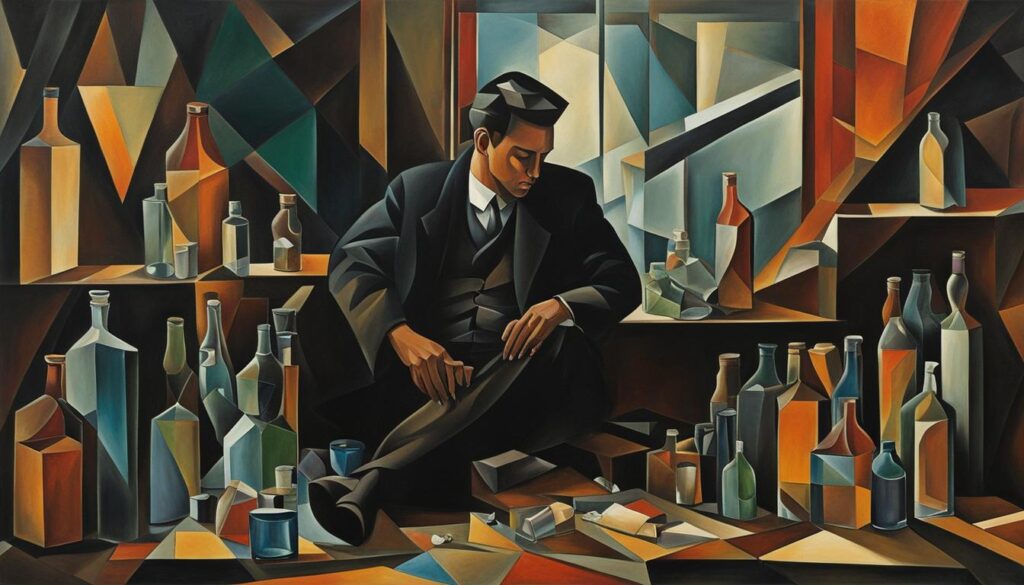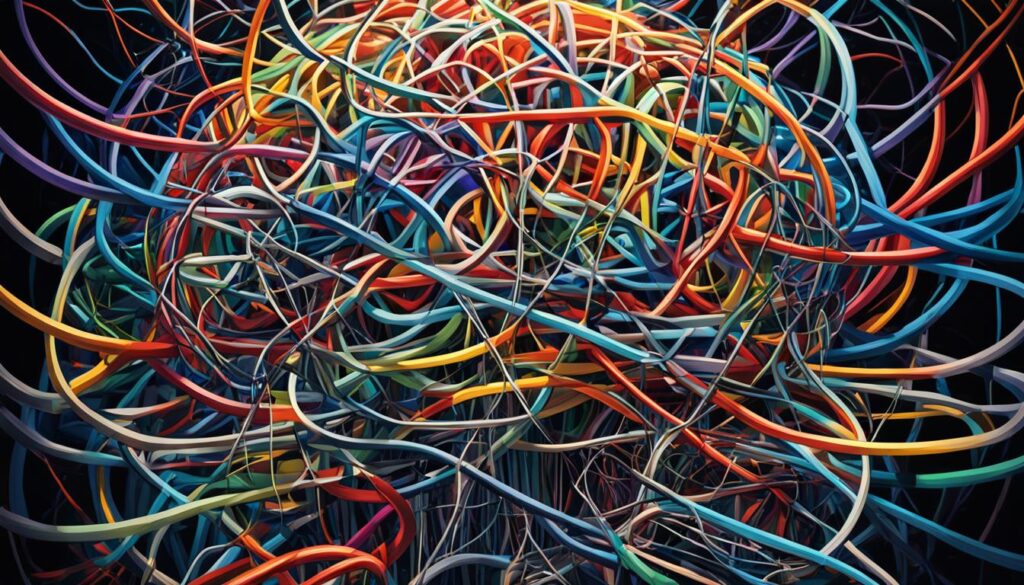Think you’re just a man of spontaneous spirit, always chasing the next big thrill? What if this relentless drive is more than mere wanderlust and hints at an unnoticed addiction crawling beneath the surface? Yes, while your buddies toast to your never-ending escapades, you might be toasting to an addiction to change without even realizing it. But don’t worry; you’re not alone in this, and identifying male addiction tendencies is the first step to regaining control.
It’s not bizarre drinks or forbidden substances we’re talking about here – it’s the insatiable yearning for the new that can secretly chain you down. While addiction awareness often centers on physical dependencies, it can easily overlook how a compulsion for change can rewire desires and reshape a life surreptitiously. At the crux of it all, is it pure healthy adaptability, or is there something more sinister lurking in your hunger for variety? Let’s unravel the threads of this subtle capture together.
Key Takeaways:
- The distinction between a free-spirited lifestyle and a potential unnoticed addiction.
- Recognizing the subtle cues of addiction to change among men.
- Addiction isn’t limited to substances – behavioral addictions are equally compelling.
- Understanding male addiction tendencies can be critical in initiating a timely intervention.
- Insights on how to foster addiction awareness and confront unnoticed dependencies.
Understanding Addiction Beyond the Substances
Let’s dive deeper into the realities of addiction that often slip unnoticed beneath the radar of men’s health concerns. While the narrative around addiction frequently centers on the substance itself, the real story lies in the subtle yet profound changes happening within the brain and the cascading effects on one’s life.

The Neurological Impact of Addiction on Men
You may think of addiction in terms of physical cravings, but the neurological effects of addiction run deeper than the urge for another fix. The brain, a marvel in its own right, becomes hijacked, with addiction rewiring its circuits and throwing off the delicate chemical balance. Dopamine, the feel-good neurotransmitter, floods the system, and over time, its natural production falters. As a result, pleasure from everyday activities diminishes, leaving men chasing a high that once came from simple joys in life.
How Priorities Shift in the Face of Addictive Behaviors
Your priorities used to be clear; health, family, career all sat comfortably at the top of your to-do list. Yet, with the infiltration of addictive behavior, these priorities begin to shift—subtly at first, but eventually, the alteration becomes stark. Hobbies gather dust, relationships strain, and career ambitions sputter as a new captain steers the ship of your desires. It’s not just about chasing the dragon; it’s about the things you let go in the pursuit of addiction, reshaping the landscape of your life.
Addiction’s ripple effects on men’s health can be profound, with changing priorities due to addiction heralding a significant decline in overall well-being. Don’t let this silent reshuffling of life’s deck go unaddressed. Seek therapy, surround yourself with support, and let the healing begin.
Are You a Man Addicted to Change and Do Not Know It?
Do you find yourself compulsively chasing the horizon, constantly itching for the next big thing? It could be a deep-seated unacknowledged addiction, a kind of silent addiction in men that society rarely speaks about. It’s a sneaky little thing, disguising itself as your ever-dynamic, adventure-seeking spirit, but what if it’s more than that? What if your spirited escapades into the unknown are actually a compulsive seeking of change, veering dangerously close to the patterns of recognized addictions?
Let’s speculate, just for a moment – you’re surfing through life on a tidal wave of incessant novelty-seeking. Can you see the ripples this might create in the serene waters of your tranquility? You might’ve notched it down as just another quirk, a unique part of who you are. But there’s merit in pausing and pondering, “Is this a quest for diversity, or am I paddling in murky waters of a stealthy addiction?”
- Have your pursuits of new experiences come at a cost to other areas of your life?
- Do you notice mood alterations with each passing fad or interest?
- Despite consequences, is there a relentless drive to revamp, reinvent, and revolutionize your world?
Just like substance addiction, the relentless chase for change can upend priorities and relationships, leaving a trail of neglected responsibilities in its wake.
| Substance Addiction | Change Addiction |
|---|---|
| Craving for substances | Craving for new experiences |
| Withdrawal symptoms | Mood swings when routine is enforced |
| Neglect of responsibilities | Prioritization of change over stability |
| Visible physical effects | Subtle impact on mental health |
So, what’s a man to do when caught in the web of this seductive addiction? First, recognize the pattern. Second, reach out – the world teems with behavioral therapy avenues and support structures like AA or NA, tailored to weave you back into the tapestry of a balanced life, free from the compulsive seeking of change. It’s about reestablishing your life’s narrative where each chapter doesn’t begin with “In a different place…” but rather, “In a deeper place…”.
Don’t let the siren song of perpetual change keep you adrift. Cast anchor, seek help, and discover the profound beauty in the layers of the familiar, the depth in the ‘ordinary’, and the stability that can foster the real adventure – a well-lived life.
Secretiveness and Isolation as Indicators of Addiction
Ever wondered why you, or someone you know, suddenly seems to turn into a hermit crab, dodging social gatherings and cloaking their life in mystery? It’s not just a newfound love for solitude—this could be a sign of a deeper issue. When addiction enters the picture, especially when tethered to the relentless chase for change, it might wrap a person in layers of secrecy. The relationship impact of addiction is real and often devastating, as the web of addiction and isolation spins its threads around an individual’s world.

Here’s a little heads up: if your phone’s getting as cold as the Arctic from lack of use and the number of unanswered texts is higher than your actual conversations, it’s a nudge to pause and reflect. Hiding away a hyper-fixation on change can do a number on relationships. You guessed it; those late nights sifting through projects or scrolling aimlessly might be indicative of more than just a busy spell or a phase of introversion. That’s right, the secretiveness in addictive behavior can often push you into a corner of isolation tougher than solving a Rubik’s Cube in the dark.
The Relationship Dynamics Effected by Addiction
Friendships, romantic escapades, even the Sunday family barbecues—all are at stake when addiction plays its hand. As you submerge deeper into the abyss of addiction, bonds that once seemed indestructible can fray like a well-worn sweater. Passion fades, disinterest in shared activities grows, and before you know it, you’re not just isolated, you’re an island, complete with palm trees of denial and sands of evasion.
Legal and Ethical Consequences Intertwined with Addictive Secrecy
But there’s more! Beyond the emotional toll, secrecy in addictive behavior can skate you right onto thin legal ice. Risky decisions and a scant regard for boundaries can slap a lawsuit onto your desk quicker than you can say “rehab.” And when ethical lines get blurred, that’s when things get stickier than an overused post-it. So muster up the courage, raise that white flag to your clandestine quests, and if you find any truth in these words—seeking help can be your boldest and most decisive maneuver yet. Remember, you’re battling for the chance to reboot your relationships and get your life’s script a shiny rewrite—without the cloak-and-dagger twist.
Emotional Turmoil and the Compulsion to Change

So, you find yourself on a rollercoaster of feelings, where one moment you’re on top of the world and the next you’re plunging into the depths of irritability? Welcome to the labyrinth of emotional instability that often engulfs men trapped in the web of change addiction. Let’s peel back the layers and scrutinize the nexus between mood swings and an obsession with change.
Deeper Understanding of Mood Swings and Aggression in Men
Between the joys of an unexpected promotion and the despair of a favorite team’s loss, life happens. But for someone grappling with addiction, these swings are more than just natural reactions; they’re amplified. We’re talking about the kind of mood shifts that send shockwaves through your life, making Mount Everest seem like a kiddie hill. Yes, this includes the addiction-related aggression that might surprise even you—the person experiencing it.
The Link Between Emotional Volatility and Persistent Change
Haven’t you noticed how seeking change can become a bit of an obsession? Your brain craves novelty, and bam!—stable routines become yawn-inducing. But often, it’s a smokescreen for the simmering pot of emotions beneath. This urge, this obsession with change, can be a disguise for the turmoil within.
| Emotional Instability Indicators | Responses to Routines | Treatment Methods |
|---|---|---|
| Heightened irritability | Resistance to daily schedules | Behavioral Therapy |
| Aggressive outbursts | Distaste for repetitive tasks | Mindfulness Techniques |
| Sudden mood dips | Boredom with stability | Emotional Regulation Strategies |
| Impulsive decisions | Hunger for new experiences | Support Groups |
Ironically, the change you seek could be the very thing fueling your choppy emotional seas. It’s a sneaky cycle, but awareness is the first step off the merry-go-round. Treatment strategies aren’t a magic wand, but they’re pretty close in stabilizing the chaos and guiding you toward tranquility—sans the constant need for a new horizon.
The Transformation of Social Circles in the Grip of Addiction
Let’s paint a vivid picture; you’re caught in a whirlwind of addiction’s effect on social life. The more fiercely you clutch the carousel of change, the more your relationships start to resemble a game of musical chairs, with players and spectators swapping seats at an alarming pace.
How Addiction Redefines Relationships and Community
Imagine your social circle as a jigsaw puzzle. Each piece interlocks, forming the snug fit of family, friends, colleagues, and companions. Now, addiction barrels in like a bull in a china shop, scattering pieces to the four winds. Those changing relationships aren’t random entropy; they’re addiction carving a path through your life, redirecting allegiances and affections. What once was a shoulder-to-cry-on becomes the enabler, the occasional happy hour pal morphs into a partner-in-crime, and genuine concern gets mistaken for buzz-killing interference.

Recognizing Negative Reinforcement and Seeking Support
Your entourage isn’t the only thing transforming. Let’s face it; you’re nodding to a different beat now. That playlist entitled ‘life’ has shuffled, leaving tracks steeped in negative reinforcement. Whether it’s “just one more drink” or a habitual nosedive into new and addictive behaviors, the chorus is the same: it feels good when it’s not, and the cost is often hidden in the fine print.
| Before Addiction | After Addiction |
|---|---|
| Family gatherings | Late-night escapades |
| Weekend sports leagues | Recovering from the night before |
| Birthday celebrations | Hitting the bars |
| Heartfelt conversations | Superficial chitchat |
But, ahoy! What’s that on the horizon? A lifeboat in the form of support for addiction. It’s the coalescence of recovering peers, empathetic counselors, and innovative therapies ready to tug your capsizing social ship away from the maelstrom. It’s about forging a new collective that prefers the terra firma of stable ground to the unmoored drift of addiction.
You’re not rewriting Shakespeare, but you are authoring a new chapter. So, seize your quill and draft this quest of community reshaping. Friends may fall away, new allies will emerge, and through it all, you remain both playwright and protagonist. Your odyssey of recovery awaits, so step off the carousel—and may your new tune be a harmonious one.
The Science Behind Toxic Relationships and Addiction
Ever felt like you’re on an emotional rollercoaster that you can’t seem to disembark? That’s your brain on toxic relationships, responding with a chemical cocktail that can feel eerily similar to addiction. So grab a seat, fasten your seatbelt, and let’s explore the fascinating science that interlinks the two.

How the Brain Responds to Toxic Romantic Encounters
You know the feeling: your pulse quickens, your palms sweat, and your thoughts obsessively circle around a person who’s become your world. It’s not just drama; it’s neuroscience at work. Your brain’s reward system gets all fired up, making you crave those unpredictable highs that toxic partners can provide. But remember, feeling addicted and being addicted aren’t one and the same.
Dispelling Myths: The Difference Between Dependence and Addiction
Let’s cut to the chase: emotional dependence on a partner can be as gripping as a subplot in a soap opera, but it’s not clinical addiction. Here’s where words matter. Addiction is a brain disorder characterized by compulsive engagement in rewarding stimuli, despite adverse consequences. Dependence? It’s more like needing someone the way you might crave your morning coffee. Sure, they both can disrupt your peace, but only one typically requires a detox and rehab stint.
Toxic relationships can send you spiraling into the science of emotional dependence vs. addiction, but they can’t turn you into an addict. Knowledge is power, so keep your wits about you as you navigate these emotional minefields.
Conclusion
If you find yourself ensnared in the relentless cycle of seeking the new and the next, if the thought of the status quo sends chills down your spine, pause and recognize—it’s a battle against change addiction. For those amongst you ready to untangle yourselves from these bindings, this article’s aim has been to shepherd you through the complexities of addiction, presenting you with the pivotal moment to step toward recovery.
Addressing the Pattern of Change Dependency for Healthy Recovery
Now is the time to act. Let’s talk about recalibrating that dial on your lifestyle—a healthy recovery requires more than just a decision; it demands a dedication to digging deep to unearth the underlying roots of your perpetual quest for change. Engage in therapies that peel back the layers of emotional dependence and anxiety. Cognitive Behavioral Therapy isn’t merely a buzzword in psychology; it’s a tried-and-true method to guide your steps toward constructive living. Remember, making adjustments isn’t about waving a white flag to enjoyment, but fostering the ability to cultivate joy in stability rather than perpetual novelty.
Where to Seek Help and the Path Forward from Addiction
Victory over change addiction begins with reaching out. Seek help through channels and spaces that nurture growth—a support group where bonds are built on shared struggles, or a therapist who’s seen this enemy before and has the battle plan to defeat it. You’re not alone in the recovery process, and whether it’s somatic exercises to connect mind and body or the solidarity found in group therapy, the resources to aid you are bountiful. So stride forward, making those healthy lifestyle adjustments, and carve out a path from the depths of dependency to the heights of an authentic life. It’s not insurmountable—you’ve got this!
FAQ
What are some signs of unnoticed addiction in men?
Look out for an increased need for change or novelty, mood swings, and a shift away from usual hobbies or social interactions as sneaky hints that an addiction might be squatting in the man cave of the brain.
Can addiction rewire a man’s brain beyond substance abuse?
Absolutely. The neurological effects of addiction on men’s health can alter the grand wiring scheme, leading to changes in mood, cognition, and – gasp – even personality.
Why do some men prioritize addictive behaviors over everything else?
When the addiction DJ starts spinning its tune, it can be more compelling than the latest banger, causing a man’s priorities to cha-cha slide into new territories.
Can you be addicted to change without knowing it?
You bet. This silent creep – compulsive seeking of change – can be just as hush-hush as a ninja in sneakers, slipping by undetected until it’s front and center stage.
What relationship dynamics might indicate a secret addiction?
If a man’s becoming more secretive than a squirrel stashing nuts and isolating like he’s training for a solo Mars mission, it might just hint at an addiction lurking in the shadows.
Are there legal and ethical risks associated with addiction secrecy?
Oh, it’s a slippery slope. Keeping addiction under wraps can lead to dubious decisions and potentially land a man in a legal pickle or an ethical quagmire.
How does addiction create emotional instability?
Strap in for a rollercoaster of mood swings and aggression, fueled by an addiction-driven obsession with change. It’s like emotional whack-a-mole—unpredictable and exhausting.
Can persistent change lead to emotional volatility?
Sure can. A man with an unwavering quest for change might find his emotions flipping more than a burger at a BBQ.
What happens to social circles when addiction takes hold?
Picture a game of musical chairs—addiction’s effect on social life may result in a reshuffling of pals, where only those who dance to the addiction tune stick around.
How can one recognize negative reinforcement in addiction and find support?
Keep an eye out for yes-men and enabling entourages. Then, flip the script and reach out for support where thumbs-ups come for kicks dropped, not picked up.
Can the brain mistake toxic relationships for addictive substances?
Kind of. The cranium can confuse a toxic love tango with addiction’s siren song, but it’s not quite the same clinical cha-cha.
What’s the real scoop on dependence vs. addiction in romantic relationships?
It’s all about differentiating a hankering for hugs from bona fide addiction. One’s like a clingy koala, and the other is more Velcro—hard to pull apart and might leave a mark.
How can men overcome an addiction to change for a healthier recovery?
Start by addressing those emotional monkey bars and anxiety swings, toss in some therapeutic chin-ups, and join a group of fellow fitness freaks on the road to recovery.
Where can men seek help for addiction and regain balance in life?
Plunge into the pool of support, from cognitive behavioral therapy lifelines to meditative floating. There’s plenty of help to swim back to the shore of a healthy lifestyle. Dive in!

